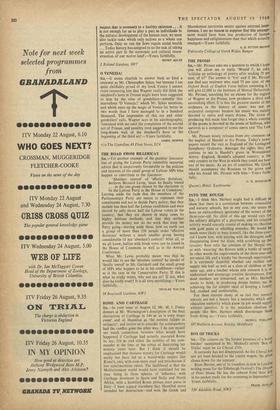ROME AND CARTILAGE
SIR,—In your issue of August 12, Mr. M. I. Finley demurs at Mr. Warmington's description of the final destruction of Carthage in 146 tic as 'a truly tragic event' and of Hannibal as 'the noblest failure in antiquity', and invites us to consider the consequences had the conflict gone the other way. I do not myself see much connection between what would have happened if Carthage had actually mastered Rome in, say, 216 BC and either the nobility of her com- mander at the time or the virtue of destroying her seventy years later. But I think it should be emphasised that decisive victory for Carthage would surely not have led to a world-wide empire like Rome's, only with even more cruel and treacherous if less sanctimonious rulers. The likelihood is that the Mediterranean world would have stabilised for the time being in three spheres of influence, with Carthage dominant in Spain and Sicily and North Africa, with a humbled Rome priouts inter pares in Italy—I have argued elsewhere that Hannibal never intended her destruction—and with the Greek and Macedonian territories secure against external inter- ference. I see no reason to suppose that this arrange- ment would have been less productive of human happiness and enlightenment than that which actuallY emerged.—Yours faithfully.
A. D. FITTON BROWN
University College of North Wales, Bangor


































 Previous page
Previous page